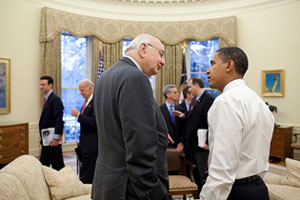Senators Carl Levin (D-Mich.) and Jeff Merkley (D-Ore.) are the latest lawmakers calling for a tough crackdown on Wall Street banks engaging in risky, leveraged betting with their own funds, or what’s called “proprietary trading.” Levin and Merkley told reporters today that they’re introducing a new bill, the Protect our Recovery through Oversight of Proprietary (PROP) Trading Act, that would mostly ban taxpayer-insured banks from engaging in proprietary trading, prohibit them from sponsoring hedge funds and private equity funds, and impose new limits on banks’ financial reserves to cushion for losses. The senators said the goal of the legislation, which is co-sponsored by Senators Ted Kaufman (D-Del.), Sherrod Brown (D-Ohio), and Jeanne Shaheen (D-NH), is to prevent banks insured with taxpayer dollars from imperiling the economy and requiring government bailouts, as they did in 2008 and 2009. “It’s important that we not allow ever again this kind of threat to our financial system,” Levin said, “and in order to do that we would put restrictions on these non-banking institutions that are too big to fail as to what kind of proprietary trading they could engage in.”
In many ways thre bill resembles the White House’s “Volcker Rules,” backed by President Obama and former Federal Reserve chair Paul Volcker, which would also ban proprietary trading. But critics of the White House’s plan say it isn’t likely to solve the problem its supporters claim it will. This kind of risky internal trading, they say, is a small portion of banks’ activities, and thus a minor part of the problem. In his statement to reporters, though, Levin countered that banks’ financial reports “tell a very different story.” He pointed to statements and regulatory filings from Bank of America, Goldman Sachs, and others showing that these institutions suffered far greater losses from prop trading than they’ve let on, and that several of these banks have previously said half their earnings have come from prop trading.
The Michigan senator said the bill would charge existing securities and financial regulators, like the FDIC and SEC, with implementation of the trading ban and other new restrictions. The regulators would also allow for certain exemptions, Levin added. These include prop trading for hedging and risk management purposes, for low-risk proprietary trading, and for trades that serve clients and not the banks themselves.
Asked why the two senators have decided to roll out a bill so similar to the White House’s plan, which has gained little traction in the ongoing financial reform talks in the Senate, Merkley told reporters, “This is the time to have the debate. The president has put the issue before us. The circumstances on the ground put the issue before us.” The bill adds a new twist to the ongoing talks to craft comprehensive financial-reform legislation in the Senate banking committee, which is expected to release a bill any day now. It’s unclear, though, whether the Senate’s version of financial reform will include a prop trading ban or not.
The new bill was immediately lauded by one pro-reform, consumer advocacy group, Americans for Financial Reform. “AFR strongly supports Senator Merkley and Senator Levin’s bill to rein in the reckless speculation that has put Americans’ hard-earned savings and taxpayer dollars on the line for big Wall Street bets,” said Heather Booth, AFR’s executive director. The bill also has a raft of support outside Congress: Economists Joseph Stiglitz, Robert Reich, and Rob Johnson, and organizations like the Community Bankers of American and the AFL-CIO have all pledged their backing.
















